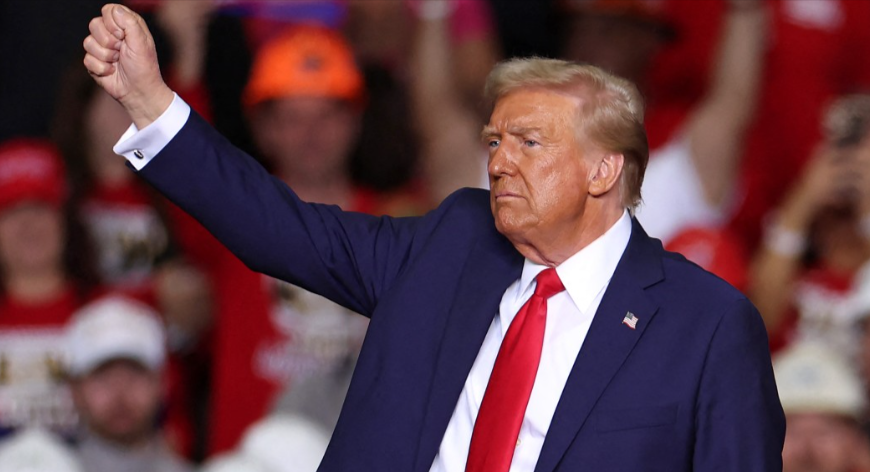Trump Releases Plan To ‘Dismantle’ The American ‘Deep State’

President-elect Donald Trump has unveiled his vision to “dismantle” what he calls the “deep state” and restore American democracy by eliminating Washington’s “corruption.”
In a recent video message, Trump presented a ten-point plan aimed at reshaping the federal government by targeting long-standing bureaucratic practices, particularly in national security and intelligence. His strategy involves using executive orders, reforms, and structural adjustments across various government agencies, emphasizing transparency and accountability.
Trump’s initial move would be to swiftly reissue his 2020 Executive Order, designed to allow the president to dismiss government officials whom he perceives as “rogue bureaucrats.” He stated, “Here is my plan to destroy the deep state and take back our democracy from corrupt Washington once and for all—and corrupt it is.” He emphasized his intent, saying, “First, I will instantly reissue my 2020 Executive Order that gives the President the power to fire bad bureaucrats, and I will use that power very strongly.”
The second point in Trump’s plan calls for an extensive review of intelligence and national security agencies, which he argues have been weaponized against political adversaries. He asserted, “We will get rid of all the corrupt people in our national security and intelligence apparatus.”
According to Trump, these agencies need restructuring to prevent what he describes as targeting conservatives, Christians, and others perceived as political foes. He believes these changes are crucial to ensure that these agencies operate with impartiality.
A third component of Trump’s plan focuses on reforming the Foreign Intelligence Surveillance Act (FISA) courts, which allow intelligence agencies to monitor individuals. He promised, “We will totally reform FISA courts, which are so corrupt that the judges seem to not care when they are lied to in warrant applications.” Trump was critical of these courts, describing a pattern of “fraudulent warrant applications” and asserting that some judges knowingly overlook problematic cases. He pledged to change this system.
Trump also wants to establish a “Truth and Reconciliation Commission” to identify and disclose any hidden misconduct within government institutions. This commission would aim to release documents that allegedly expose “deep-state buying, censorship, and corruption” to the public. “We will set up a truth and reconciliation commission to declassify and publish all documents on the buying, censorship, and corruption by the deep state,” he said, arguing that this step would promote transparency by revealing internal workings to the public.
In his fifth proposal, Trump vowed to “major crackdown” on government leaks, targeting individuals who disclose information to the media. He claimed that such leakers collaborate with “fake news” to disseminate false information and destabilize the government. He said, “We will crack down hard on government leakers who work with fake news to spread lies and undermine our government and democracy,” suggesting that such actions could lead to criminal charges.
To improve oversight, Trump’s sixth proposal involves separating each inspector general’s office from the departments they oversee. He argued that this separation would prevent these offices from acting as “guardians” of the “deep state.” He stated, “We will separate every inspector general’s office physically from the departments they are in charge of so they don’t become the deep state’s guardians.”
Trump also aims to work with Congress to create a system of independent auditors to monitor intelligence agencies continuously, ensuring they do not conduct unauthorized surveillance on Americans or interfere in elections. He explained, “I will ask Congress to set up an independent auditing system to keep an eye on our intelligence agencies,” emphasizing the importance of privacy protection and preventing unauthorized surveillance.
In his eighth point, Trump proposes relocating many federal jobs outside of Washington, D.C., to decentralize federal operations. He cited his relocation of the Bureau of Land Management to Colorado as an example, suggesting that up to 100,000 federal jobs could be shifted to regions across the country with a strong sense of patriotism.
For his ninth point, Trump wants to end the “revolving door” between government and private-sector positions. He expressed concerns about federal officials taking roles with companies they once regulated, arguing that this practice creates conflicts of interest. He pledged, “We will work to stop federal bureaucrats from taking jobs at the companies they deal with and that they regulate,” specifically mentioning the pharmaceutical industry.
Finally, Trump plans to propose a Constitutional amendment that would impose term limits on Congress members. He believes that term limits would prevent the accumulation of power, foster fresh ideas in Washington, and reduce the sway of entrenched special interests. He concluded, “This is how I will break up the deep state and bring back a government that works for and with the people.”
Trump’s bold ten-point plan signals his commitment to significant government reform and anti-corruption efforts.
He is calling on supporters who share his concerns about the “deep state” and its influence on American democracy to rally behind him.